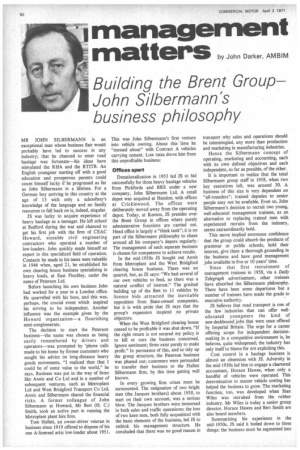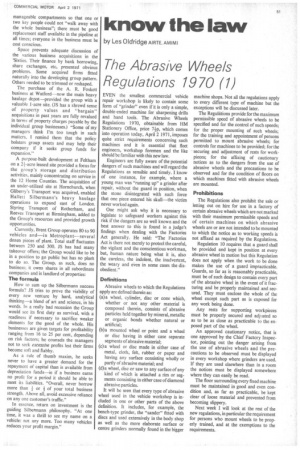management
Page 52

Page 53

If you've noticed an error in this article please click here to report it so we can fix it.
matters by John Darker, AMBIM
Building the Brent Group John Silbermann's business philosophy
MR JOHN SILBERMANN is an exceptional man whose business flair would probably have led to success in any industry; that he chanced to enter road haulage was fortunate—his ideas have stimulated the RHA and the RTITB. An English youngster starting off with a good education and prosperous parents could count himself lucky if he progressed as far as John Silbermann in a lifetime. For a German boy arriving in this country at the age of 13 with only a schoolboy's knowledge of the language and no family resources to fall back on is, indeed, singular.
JS was lucky to acquire experience of heavy haulage as a teenager. He left school at Bedford during the war and chanced to get his first job with the firm of CEAC Howard, sizeable civil engineering contractors who operated a number of low-loaders. John quickly made himself an expert in this specialized field of operation. Contacts he made in his teens were valuable in 1946 when, aged 21, he established his own clearing house business specializing in heavy loads, at East Finchley, under the name of Peterson Ltd.
Before launching his own business John had worked for a year in a London office. He quarrelled with his boss, and this was, perhaps, the crucial event which inspired his striving to be independent. Another influence was the example given by the Howard organization—a flourishing mini-conglomerate.
The decision to start the Peterson business—the name was chosen as being easily remembered by drivers and operators—was prompted by 'phone calls made to his home by former customers who sought his advice On long-distance heavy goods movements. "I realized then that I could be of some value to the world," he says. Business was put in the way of firms like Annis and Co Ltd and in a number of subsequent ventures, such as Metroplant Ltd and West Bridgford Transport Co Ltd, Annis and Silbermann shared the financial risks. A former colleague of John Silbermann at Howard, Mr Bert (H. C.) Smith, took an active part in running the Metroplant plant hire firm.
Tom Hallett, an owner-driver veteran in business since 1919 offered to dispose of his one A-licensed artic low-loader about 1951. This was John Silbermann's first venture into vehicle owning. About this time he "messed about" with Contract A vehicles carrying cement. Low rates drove him from this unprofitable business:
Offices apart
Denationalization in 1953 led JS to bid successfully for three heavy haulage vehicles from Pickfords and BRS under a new company, John Silbermann Ltd. A small depot was acquired at Hendon, with offices at Cricklewood. The offices were deliberately moved away from the operating depot. Today, at Kenton, JS presides over the Brent Group in offices where purely administrative functions are carried out. Head office is largely a "think tank"; it is no part of the Silbermann philosophy to chase around all his company's depots regularly.The management of each separate business is chosen for competence to achieve results.
In the mid-1950s JS bought out Annis from Metroplant and the West Bridgford clearing house business. There was no quarrel, but, as JS says: "We had several of our own vehicles to feed, so there was a natural conflict of interest." The gradual building up of the fleet to 11 vehicles by licence bids attracted the inevitable opposition from State-owned companies, but it is with pride that JS says that the group's expansion inspired no private objectors.
When the West Bridgford clearing house ceased to be profitable it was shut down. "If the right return is not secured my policy is to kill or cure the business concerned. Ignore sentiment; firms exist purely to make profit." In pursuance of this, and to tidy up the group structure, the Peterson business was phased out; customers were persuaded to transfer their business to the Hallett Silbermann firm, by this time getting well known.
In every growing firm crises must be surmounted. The resignation of two bright men (the Jacques brothers) about 1958, to start on their own account, was a serious blow. The Jacques brothers were immersed in both sales and traffic operations; the loss of two keen men, both fully acquainted with the basic elements of the business, led JS to rethink his management structure. He concluded that there was no good reason in transport why sales and operations should be intermingled, any more than production and marketing in manufacturing industries.
Hence the Silbermann concept of operating, marketing and accounting, each with its own defined objectives and each independent, so far as possible, of the other.
It is important to realize that the total Silbermann group staff in 1958, when two key executives left, was around 30. A business of this size is very dependent on "all-rounders"; trained deputies to senior people may not be available. Even so, John Silbermann's decision to recruit two young, well-educated management trainees, as an alternative to replacing trained men with experienced recruits from the industry, seems extraordinarily bold.
This move implied enormous confidence that the group could absorb the products of grammar or public schools, hold their interest, give them a thorough grounding in the business and have good management jobs available in five or 10 years' time.
Since that first recruitment of management trainees in 1958, via a Daily Telegraph advertisement, other trainees have absorbed the Silbermann philosophy. There have been some departures but a number of trainees have made the grade to executive authority.
JS believes that road transport is one of the few industries that can offer welleducated youngsters the kind of non-deskbound jobs that were once offered by Imperial Britain. The urge for a career offering scope for independent decisionmaking in a competitive environment is, he believes, quite widespread; the industry has only itself to blame for not exploiting this.
Cost control in a haulage business is almost an obsession with JS. Adversity in the mid-1950s led him to engage a chartered accountant, Horace Hawes, when only a handful of vehicles were operated. This determination to master vehicle costing has helped the business to grow. The marketing function, too, was developed when Stan Wiles was recruited from the rubber industry. Mr Wiles is today a senior group director. Horace Hawes and Bert Smith are also board members.
Summarizing his experience in the mid-1950s, JS said it boiled down to three things: the business must be segmented into manageable compartments so that one or two key people could not "walk away with the whole business"; there must be good replacement staff available in the pipeline at all times; everyone in the business must be cost conscious.
Space prevents adequate discussion of the various business acquisitions in the 'Sixties. Their finance by bank borrowing, share exchanges, etc, presented obvious problems. Some acquired firms fitted naturally into the developing group pattern. Others needed to be trimmed or reshaped.
The purchase of the A. R. Foskett
business at Watford now the main heavy haulage depot—provided the group with a valuable 1-acre site. (JS has a shrewd sense of property values and "bargain" acquisitions in past years are fully revalued in terms of property charges payable by the individual group businesses.) "Some of my managers think I'm too tough in such matters, I remind them that the policy bolsters group assets and may help their company if it seeks group funds for expansion.
A purpose-built development at Feltham on a 2-;-acre leased site provided a focus for the group's storage and distribution activities, mainly concentrating on service in the 12 Home Counties. The acquisition of an under-utilized site at Hornchurch, when Gliberry's Transport was acquired, enabled Hallett Silbermann's heavy haulage operations to expand east of London. Styring Transport of Rotherham, and Reeves Transport at Birmingham, added to the Group's resources and provided growth opportunities.
Currently, Brent Group operates 80 to 90 vehicles and—in Metroplant—several dozen pieces of plant. Total staff fluctuates between 250 and 300. JS has had many takeover offers; the Group would like to be in a position to go public but has no plait to do so. The Group, as such, does no business: it owns shares in all subordinate companies and is landlord of properties: The formula
How to sum up the Silbermann success formula? JS tries to prove the viability of every new venture by hard, analytical thinking—a blend of art and science, in his words. In a really bad recession the Group would see its first duty as survival, with a readiness if necessary to sacrifice weaker elements for the good of the whole. His businesses are given targets for profitability ranging from 16 to 25 per cent, depending on risk factors; he counsels the managers not to seek excessive profits lest their firms become soft and flabby.
As a rule of thumb maxim, he seeks never to have a greater demand for the repayment of capital than is available from depreciation funds—ie if a business earns no profit for a period it should be able to meet its liabilities. "Overall, never borrow more than or of your total business strength. Above all, avoid excessive reliance on any one customer's traffic."
In essence, return on investment is the guiding Silbermann philosophy. "At one time, it was a thrill to see my name on a vehicle: not any more. Too many vehicles reduces your profit margin."




























































































